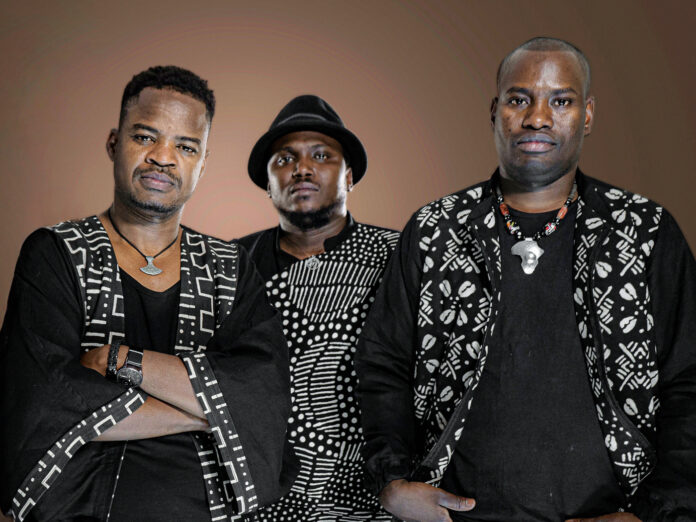When Tinariwen popularised the idea of desert blues in the West, bandmembers’ previous participation in Tuareg rebel warfare lent their music heroic romance, conjuring images of nomad players as comfortable with a machine gun as a guitar, and finally manifesting The Clash’s fanciful notion of combat rock. The blues’ feedback loop from West Africa through American slavery to Hendrix seemed satisfyingly complete in their dusty grooves.
Songhoy Blues followed broadly in this musical tradition, but are from a different time and place, and tell a significantly different tale. The Songhoy people originate from the region around the River Niger in Northern Mali which was conquered first by Tuareg rebels then music-loathing Islamists. Guitarist Garba Touré escaped to the capital Bamako in 2012, forming the descriptively named Songhoy Blues with exiled compatriots. Touré was steeped in Hendrix, and (unlike Tinariwen, initially) John Lee Hooker and BB King’s US blues, alongside hip-hop and a multiplicity of Malian styles, forming the basis of the band’s crowd-rousing electric attack. As their participation in the brutal documentary First They’ll Have To Kill Us demonstrates, there is little romance in their background. Instead, this is blues in its fundamental sense: refugee music, played with redemptive joy, but suffused with inconsolable longing.
Songhoy Blues’ three previous albums and thrilling live shows have majored in electric Malian R&B, born out of the steamy Bamako clubs where they started. Héritage is a handbrake turn to acoustic music, with Garba Touré’s trademark electric playing mostly absent. “We always wanted to make an acoustic album,” Touré explains. “When we started the group, all of our songs were composed around a calabash and an acoustic guitar. But when we started playing in clubs things started changing very quickly for us – especially with Africa Express, where we were accelerated even further…[but] we always kept in mind the idea of acoustic Songhoy Blues music.”
Confined to Mali by Covid, they finally had the time, and the opportunity to not only unplug, but connect to Bamako’s sometimes febrile cultural mix, with its edge of violence from military government and continuing conflict in the north. They invited dozens of musicians from every section of Malian society, from childhood heroes such as balafon virtuoso Neba Solo to Ali Farka Touré collaborators Dassi Mabo and Afel Bocoum and ngoni player Mamoutou Diabaté, a guestlist even broad enough to include Texan slide guitarist Kim Herriage.
This was no mere supergroup blow-out. Songhoy Blues songs are typically socially concerned and instructive in nature, and Héritage embodies their desires for their multi-ethnic nation. “There is total confusion at the centre and in the north, creating a climate of mistrust between people,” bassist Oumar Touré explains. “That’s why Héritage is a response to the call to live together, to revalorise our culture from north to south, to avoid amalgamation. So while we’ve remained almost entirely within our pentatonic musical pantheon, we’ve brought in musicians and singers who we felt exemplified different aspects of Malian culture. Malian music has always been a blend of the ethnic groups that make it up, that’s its beauty.”
With what Garba Touré terms their Afro-rock’n’roll dialled down, Paul Chandler and the band’s co-production deploys their epic cast as distinct elements in ultimately communal music. The studio sounds packed yet with sufficient space for each individual contribution. “Borotery” exemplifies the stripped-back yet rich sound-world, as Garba Touré’s languidly intricate acoustic intro precedes a relaxed but thickly woven mix of wailing Texan steel guitar, pastoral flute and twin ngonis. “Batto” then briefly lets Touré cut loose with raw electric squalls taped as if distantly heard over a transistor radio, bracketed by rustic ngoni strums. “Gara”, a gently sung admonition for children to obey their elders, is driven home with mantric insistence, and “Toukambela” replaces electric volume with a simmering polyrhythmic maelstrom streaked with flashes of Malian flute, violin and single-stringed monochord, while Aliou Touré confides and exhorts. The plethora of contributors also lets “Dagabi” ride on Neba Solo’s relentlessly pulsing balafon and set Aliou Touré against massed male and female choruses, in punchy acoustic Malian R&B which lacks nothing in assaultive power.
“Issa” concludes Héritage with an eco-conscious protest song about the need to protect rivers as sources of life. Songhoy Blues are surely thinking of the Niger, whose bend contains their currently lost homeland. Garba Touré’s opening acoustic strum, though, comes straight from the Mississippi, ’til it becomes a tributary of calabash beats and Aliou Touré’s sometimes eager, sometimes yearning voice. Héritage blends traditions from Clarksdale to Timbuktu, bringing it all back to a multitude of homes, until Songhoy Blues one day return to theirs.



